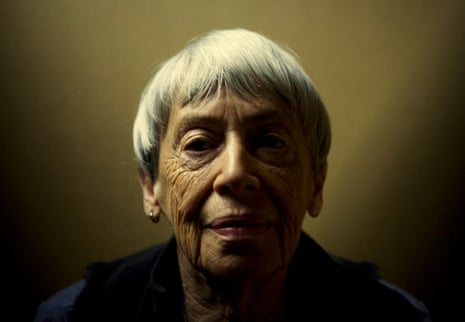I am very sad that Ursula K Le Guin has died. Not only was she one of the literary greats of the 20th century – her books are many and widely read and beloved, her awards are many and deserved – but her sane, committed, annoyed, humorous, wise and always intelligent voice is much needed now.
Right before she died, I was reading her new book, No Time to Spare, a collection of trenchant, funny, lyrical essays about everything from cats to the nature of belief, to the overuse of the word “fuck”, to the fact that old age is indeed for sissies – and talking to her in my head. What if, I was saying – what if I write a piece about The Left Hand of Darkness, published by you in 1969? What if I say it’s a book to which time has now caught up?
Consider: the planet of Gethen is divided. In one of its societies, the king is crazy. Cabals and personal feuds abound. You’re in the powerful inner circle one day, an outcast the next. In the other society, an oppressive bureaucracy prevails and a secret committee knows what’s best. If judged a danger to the general good you’re deemed persona non grata and exiled to a prison enclave, with no trial or right of reply.
What do you think, Ursula? I asked her in my head. Were you predicting anything? Not exactly, she answered. It’s a thought experiment. But then, so is our society. In all her work, Le Guin was always asking the same urgent question: what sort of world do you want to live in? Her own choice would have been gender equal, racially equal, economically fair and self-governing, but that was not on offer. It would also have contained mutually enjoyable sex and good food: there was a better chance of that.
Le Guin was born in 1929: a child in the depression, a teenager in the second world war, then at college right after the war, in that moment that seemed so filled with the spirit of renewal. She went to Radcliffe, a liminal space then: it was Harvard but not really, its women allowed some participation but not full access. She would have strolled past the dining hall, where – she would have been told – the male students used to pelt with buns any female who dared to show her face. (Once she became a writer – a science fiction writer, among other things – the men defending that particular tree house continued the exclusionary bun-pelting. She took note, and was not amused.)
After Radcliffe she went to graduate school, studying French and Italian literature. She was taught to think, as they used to say, like a man: widely, curiously, rigorously. But after she married and left academia, she found herself in a society that treated her and all women – from a legal point of view – like an irresponsible 13-year-old. For those who’d been taught they were grownups, this was like trying to seal a volcano inside a tin can. It was this generation of American women that fuelled much of the second wave feminism of the late 1960s and 70s, which was when that particular tin can exploded. This was a time of high energy for Le Guin the writer.
But political thought and activity was just one facet of this astonishingly talented woman’s multifaceted life and work. The Earthsea trilogy, for instance, is a memorable exploration of the relationship between life and death: without the darkness, no light; and mortality allows all that is alive to be. The darkness includes the hidden and less pleasant sides of our selves – our fears, our pride, our envy. Ged, its hero, must face his shadow self before it devours him. Only then will he become whole. In the process, he must contend with the wisdom of dragons: ambiguous and not our wisdom, but wisdom nonetheless.
Recently, not long before Le Guin died, I found myself talking with a much younger woman who was mourning the loss of a friend. “Read the Earthsea trilogy,” I suggested. “It will help.” She did, and it did. Now I will take my own advice, and meet with Ursula again in her own thought experiment, and say Hail and Farewell, and thank you.
It’s time for some dragon wisdom.

Comments (…)
Sign in or create your Guardian account to join the discussion